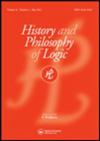Bolzano on Bolzano: A Hitherto Unknown Announcement of Bolzano’s Beyträge
IF 0.5
3区 哲学
Q3 HISTORY & PHILOSOPHY OF SCIENCE
引用次数: 0
Abstract
ABSTRACT In 1817, in the preface to his Rein analytischer Beweis, Bernard Bolzano revealed that he had decided to postpone the publication of any subsequent instalment of his Beyträge zu einer begründeteren Darstellung der Mathematik because of the few and ‘superficial’ reviews of its first instalment, published in 1810. Bolzano’s transcriptions of the only two known reviews of this book are conserved at the Literární archiv Památníku národního písemnictví / Muzea literatury, in Prague, together with another manuscript on his Beyträge, the provenance of which was unknown to Bolzano’s scholars until recently. In this paper it is shown that this latter manuscript is a draft of an announcement that was published at the time and that was indeed written at least to some extent by Bolzano himself. This hitherto unknown announcement of Bolzano’s Beyträge not only solves the mystery surrounding that manuscript, but also helps to date the publication of this book more precisely and provides an unusual insight into what we must take Bolzano himself to have considered most noteworthy about his work, namely his study on logic. The paper includes a transcription of the manuscript and an English translation of the announcement.博尔扎诺对博尔扎诺:迄今为止未知的博尔扎诺的Beyträge公告
本文章由计算机程序翻译,如有差异,请以英文原文为准。
求助全文
约1分钟内获得全文
求助全文
来源期刊

History and Philosophy of Logic
综合性期刊-科学史与科学哲学
CiteScore
0.80
自引率
0.00%
发文量
24
审稿时长
>12 weeks
期刊介绍:
History and Philosophy of Logic contains articles, notes and book reviews dealing with the history and philosophy of logic. ’Logic’ is understood to be any volume of knowledge which was regarded as logic at the time in question. ’History’ refers back to ancient times and also to work in this century; however, the Editor will not accept articles, including review articles, on very recent work on a topic. ’Philosophy’ refers to broad and general questions: specialist articles which are now classed as ’philosophical logic’ will not be published.
The Editor will consider articles on the relationship between logic and other branches of knowledge, but the component of logic must be substantial. Topics with no temporal specification are to be interpreted both historically and philosophically. Each topic includes its own metalogic where appropriate.
 求助内容:
求助内容: 应助结果提醒方式:
应助结果提醒方式:


